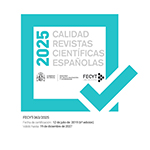Work-family conflict of women teleworking due to the health contingency related to COVID-19 in Chile
Abstract
Objective. This article analyzes the characteristics of the interaction between paid and unpaid work for Chilean women who, since the health crisis caused by COVID-19, have had to start working from their homes. Methodology. We worked with a mixed online questionnaire (N = 1137) applied between April and June 2020. We present the responses to the likert questionnaire and analyze in depth the open questions. Results. The participants have a negative perception of telework in a pandemic, showing conflicts in the work/family relationship, time overload, unbalanced use of spaces and little family and work co-responsibility. Finally, it is possible to recognize various narrative resources of resistance to the patriarchal construction of gender roles and recognition of the situation experienced as an issue that affects a large number of women in Chile. Conclusions. Our results show the existence of a conflict that has affected the interaction between work and family life of women, who have had to face a scenario of implementation of social isolation measures and a telework modality characterized by improvisation, which has forced them to face the crisis through the deployment of their own resources, self-organization capacities and individual learning, with heavy costs for their mental health.
Downloads
Article download
License
In order to support the global exchange of knowledge, the journal Investigaciones Feministas is allowing unrestricted access to its content as from its publication in this electronic edition, and as such it is an open-access journal. The originals published in this journal are the property of the Complutense University of Madrid and any reproduction thereof in full or in part must cite the source. All content is distributed under a Creative Commons Attribution 4.0 use and distribution licence (CC BY 4.0). This circumstance must be expressly stated in these terms where necessary. You can view the summary and the complete legal text of the licence.











